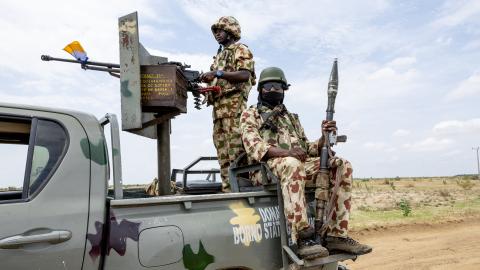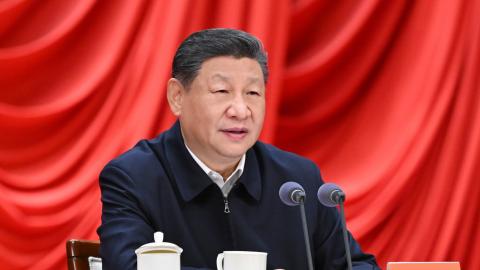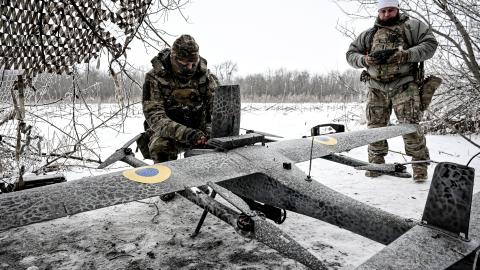
Lithuanian Foreign Minister Kęstutis Budrys on NATO, Energy Security, and Europe-China Relations
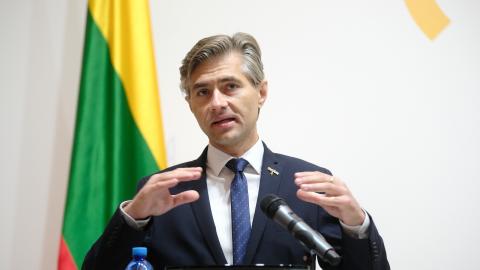
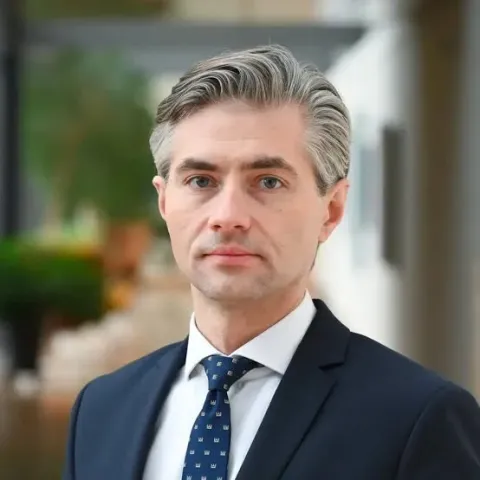
Minister of Foreign Affairs, Lithuania

Senior Fellow
Marshall S. Billingslea is a senior fellow at Hudson Institute, focusing on illicit finance and arms control.
Lithuania continues to be a leading North Atlantic Treaty Organization ally due to both its investment in its own defense capabilities and its outsized role in supporting Ukraine. Amid Russia’s continued aggression against Ukraine and expanded hybrid operations across Europe, Vilnius has been a leading voice on security threats along NATO’s eastern front.
Join Lithuanian Foreign Minister Kęstutis Budrys and Senior Fellow Marshall Billingslea for a discussion on collective defense, energy and economic issues, the Lithuanian perspective on relations with China, and more.
Event Transcript
This transcription is automatically generated and edited lightly for accuracy. Please excuse any errors.
Marshall Billingslea:
Well, thank you everybody for joining us at the Hudson Institute with a very rare opportunity and a privilege to host Lithuania’s Foreign Minister, Kęstutis Budrys.
Kęstutis Budrys:
Thank you.
Marshall Billingslea:
I’ve known you for a while, but it’s great to have you here in Washington. And let just open it up with just a couple quick comments and then want to turn it right to you because they’re here to listen to you. But since you regained independence from Soviet control, Lithuania has been, in my view, a very close friend and partner of the United States. In fact, I was at the NATO headquarters in 2004 as Assistant Secretary General when we brought you into the alliance. In fact, I hired the first Lithuanian onto the international staff at NATO at that time that year. And you’ve made not only enduring commitments to the alliance, but also in a bilateral way with the United States, you sent special operations forces to Afghanistan. You even took over a PRT in Khost province. In fact, a soldier was killed, Lithuanian soldier was killed there.
And so we remember that with appreciation. The world has changed a lot and Lithuania, together with the United States, continues to ride the roller coaster of international affairs. So with that, I’d just like to open it up to you for whatever comments you’d like to make. And I’d like to in particular get your thoughts on what role NATO plays in the international security framework. What role does it play for Europe and Europeans? What role should Lithuania play inside the Alliance and what role do you want the United States to play within NATO? But again, minister, it’s great to see you.
Kęstutis Budrys:
Thank you. Thank you for inviting me here and it’s my pleasure and honor to be here and to discuss these issues. And when you started your question with the historical perspective from 1990, I thought, and with the strategic partnership and relations and Lithuania’s attitude towards the United States, I thought, okay, where to start? It’s like whether it is Kosciuszko and then the end 18 century, whether it’s around between war period or the Soviet occupation period, when the United States never recognized the occupation of Lithuania or the Baltic States. And still we still kept the embassy that is in the proximity over here, and this was the guarantee of continuation of our statehood. Then after the occupation, we reestablished now our country. So I cannot imagine how someone from Lithuania can not value this huge commitment of United States that it was there and that will remain with the generations to come and absolutely clear on it.
Of course, there are other elements that we built our strategic partnership on, and that is the fundamental understanding of the security in the current world. And understanding what are the driving forces, where are the blocks, what Russia and other authoritarian regimes want from us. And in seeing this big picture, setting the very central place for NATO, I think that’s what we have to do. Even thinking about the other hemispheres, just thinking about the Indo-Pacific, no other places or Middle East, we have to put NATO in front of it because it is most effective. It is working. It is the huge power that provides us all deterrence and provides us all security and we have to continue it. And just try to take out the NATO from the picture and try to imagine where it would be right now without this organization. I’m not saying that we’ll be in the war immediately.
I would say that we have to think about creating something like this because we have to have the alliance. This is only how alliance works and in the purpose of deterrence, we need three conditions for deterrence. We need forces. That’s the net assessment, be it regional, be it continental or global. We need strong alliances that were tested in the previously and we have to project the absolute trust in what we are doing, to our adversary. What concerns allied partnerships and commitment to defend each other. Now this is how it works. So in our calculation, be it very front line or be it somewhere else on the south end part of NATO, we need forces to be there, to be built.
They have to be visual, you have to see them, you have to see the bases, you have to see all the deployments, training and then drills. It’s not like us have to see it, that Russia has to, and then others that want to challenge it has to see it. And then another element, we already have the proven alliance within the operations that you just mentioned, be it Iraq, be it Afghanistan, or be it whole fight against international terrorism. And then we need to have these strong examples, how it works right now. So from the big picture, I’m going to this smaller picture and we have problems here with deterrence working till the level when Russia is not trying to violate our airspace, not to violate our undersea infrastructure. And this is the signal and this is the alarm for us to rebuild it immediately. We have to build our deterrence back the way it was.
Marshall Billingslea:
Well, of course, because the Russians don’t recognize restraint, the Russians view restraint as weakness.
Kęstutis Budrys:
Yes, and this is simple truth that it was proven so many times in all the history and we have still to return and return to it. And this is something stuck, this bad idea. And this is the product of the propaganda coming from Russia that the only thing that you shouldn’t do with Russia, don’t escalate. Who created this? You shouldn’t afraid to escalate. This is what works. And this is what worked in Baltic Sea. What concerns undersea infrastructure. They were messing around with the shadow fleet vessels. Some of them were absolutely poor condition. And this is how the incidents with our undersea infrastructure happened, where there were cables cut for electricity, for data, gas pipeline was also damaged there. When we escalated, someone would say a bit and initiated the enhanced vigilante activity in the Baltic Sea Baltic century, it stopped. More NATO vessels means more precaution measures from Russia. Same happens with drones.
Marshall Billingslea:
We had four years under the Biden administration with a government that was deathly afraid of escalation with the Russians. And worked overtime to deter themselves from taking a number of actions that could have, I think brought the fighting in Ukraine to a much earlier end. They were even so afraid of Putin that they told the Treasury, and I know you were just with the Secretary of the Treasury, but when the Treasury wanted to sanction Putin’s mistress, the White House told Treasury it would be escalatory. Of course, the Brits came out and sanctioned her the next day. The world didn’t end. And we moved on with all of these provocations and incursions, the drone incursions, the airspace incursions with fighter jets, with all of the sabotage activities that are happening around Europe, what should the response be and how should NATO and NATO allies either collectively or individually escalate to show the Russians that this will be matched and we in fact are prepared to go beyond what they’re up to?
Kęstutis Budrys:
Yeah, we should do what is proven and what works. So from all the lessons back from our experience, we should look into those cases that actually worked and our tools and our policies worked. And those are the ones that were, what I’m mentioning with Baltic century, with eastern century and drones with their sabotage operations. That is a more tricky thing. This is not instrumentalized. Some activities, criminal activities, it’s not shadow fleet vessels. That is the military intelligence operations. And this is a bit sort of different things and we have to respond in other areas. But in all of these activities, when we increase our posture, when we show the strength, when we are not afraid to increase the pressure, we have also simultaneously to increase assistance to Ukraine because this is what they’re trying to prevent. This is why they’re messing with this security sense in our society is showing that, look, your government is not in control of what is happening here in your backyard.
Why are they involved in some way in Ukraine? So we have to prove that they’re wrong and then put extra euro, extra dollar and extra weapons and ammo to Ukraine showing that it won’t work this way. And in talking about the escalation and de-escalation and about all the spurs, it’s not only about us. Because of course we have the option. We can go up, we can go down. But it’s also about your adversary, your enemy, what he or she thinks about it. You cannot just isolate your thinking. And I would think that Russians would think, we know what they’re thinking about us. And each time when we restrain ourselves, they think that you are okay. We are weak, you are—.
Marshall Billingslea:
They go further.
Kęstutis Budrys:
So it means that we can put pressure on you. This is how it works. And they have to feel it. And all the time when we just prepared the concepts or plans or something that is not backed by hard force, by steel, they don’t believe it. And I know it by different cases and where we knew the details, how Russians saw it, how they reported about it. That is why returning to NATO, our operational plans that were well-written, thick book, how we will fight Russians, it has now to be backed by real forces and by storage houses filled with ammo with everything that we still don’t have. And you asked about the role of United States. This is the role of United States, to kick sometimes, to push and pull, to convince and to move Europeans towards more, doing more for their defense.
Marshall Billingslea:
You used the word steel and I think that’s exactly right. Know Lenin said, "Probe with your bayonet and if you encounter mush, push. If you encounter steel, withdraw." So this has been Russian thinking for a very long time. Let’s talk a little bit about the steel that Lithuania provides to NATO. For many years, you have been well above the goal, the 2 percent GDP expenditure target. That was a formal NATO goal. And in fact, even with the most recent decisions you are headed. . . I think you’re at 4 percent this year in GDP. And the government has talked about perhaps getting up to 5 percent or thereabouts.
Within the deliberations of the Lithuanian government, what are the most important capabilities that you want to have for yourself? And what do you look to allies? Of course the Germans are in Lithuania, the U.S. has a rotational battalion there as well. We’re a little bit worried about some decisions made regarding the brigade, the rotational brigade in Romania being pulled back. So I think there’s a lot of discussion happening here in Washington about whether that’s a wise idea or not. But love to get your thinking on both. What are you bringing to the table and what do you want your allies to bring to the table as well?
Kęstutis Budrys:
We were what we need for NATO operational plans being executable. So we have the plans. So we have not only the idea, but very exact projection of our forces and different tasks that would be dedicated for each nation formation troops in different areas. And we need capabilities for it. And we have the capability goals, also agreed by NATO. And we have to build those forces, those capabilities because they won’t appear from nowhere. And in our case, that is the strong Land Forces Division in Lithuania. That is our priority number one. We want it to be fully operational till 2030, meaning that they can maneuver. They have the tank battalion, they have the additional artillery forces, they have all the enablers, their ear defense. And this is how we would see our working division. And with this one as a number one priority with the second host nation support for allies that deploy the troops United States, we already provide the state-of-the-art infrastructure that is needed for your troops to be there. Not only to be there to live there that they-
Marshall Billingslea:
I’ve been to. . . I mean, for the Hudson audience, the investment that the government of Lithuania made in those, they’re not barracks. These are high-end residential dormitory accommodations for the US troops. And I think it speaks volumes to the importance that you attach to the US troops that we do rotate on a regular basis. So that’s just a fantastic investment that you’ve made. You mentioned Soviet occupation. You have in the old KGB headquarters off of the main square in Vilnius, you have the Museum of the Occupation. And when you go visit that museum and you see what the Soviets did to the Lithuanian people, taking the children and shipping them, sending people to the gulags, mass executions and murder, including in the basement of that building, torture.
This is the same playbook we see the Russians doing now with Ukraine. So talk to us a little bit about how you see the fight that the Ukrainians are putting up against the Russian invaders. Where do you feel like the Ukrainians are making progress, and where do you feel that allies need to do more to reinforce the Ukrainians to ensure as they go into a very cold winter with the Russians now striking the electrical grid to freeze the Ukrainian people, what more can and should be done? And for that matter, what has Lithuania been to help the Ukrainians? Because I know you’ve been doing a lot.
Kęstutis Budrys:
I was visiting very recently KGB Museum again, and I had the different impression actually from the previous times that I did before ‘22, before Russia’s full-scale invasion in Ukraine. And the difference is that somehow I was putting myself into the different period of time. That was some cruelties so from the Second World War and after second World War and then generation changed and maybe people are different now and maybe the standard of human rights is different. Maybe it won’t repeat. It’s not about the all-pervasive activities of KGB, that it was about the interrogations, that it was those special cells that were dedicated to dehumanize, but what we’ve seen in Ukraine. So it proves that it just repeats itself. And even with small atrocities that were done then against us. And this is really shocking and it tells us, I think a lot about the human beings as such.
And we cannot think that we are progressing somehow into the better quality as human beings. We do not leave some actions to decide to the history. What I see from the reports, what conditions are for the prisoners of war or those that are not considered prisoners of war, women, civilians, you have no rights. If you are male in an occupied territory of Ukraine and you’re from 16 till 60, you will be interrogated and in hard way. And this is how it is. So all the ideas about in Lithuania’s, thinking about the defense of staying behind, non-collaborating with occupied if something happens in some of the years, so we push them away and it won’t be like this. You have to leave that area and. . .
Kęstutis Budrys:
. . . only be like this. You have to leave that area and then to fight back because all the civilians, they will suffer a lot. Like with children you mentioned that were taken from families in Lithuania. So they’re doing the same in Ukraine. Up to 30,000 children were abducted and some of them were brought to Belarus actually, to another ally of Russia and re-indoctrinated. And some of those children were returned to battlefield on the side of Russia to fight against Ukrainians.
This is war crime by the very definition. And then this is repeating. So we keep one track on the legal side, what we will do with accountability. That’s why the special tribunal is so much needed for history, for future generations, just to remember that we were not okay with this. And it requires a responsibility, accountability for it. And this another track for the planning of our own defense. We won’t allow our civilians in the case that this happens to be in that area. That is why our decision on spending more on defense was based on the capabilities that we need to hold our territory. Together with United States troops, together with German brigade, that we also build a huge infrastructure in Lithuania. With our division, we can do this. We can deny the territory. Of course we will need the assistance, enablers and we will need the EF force supporting us, but we can deny the territory.
And that was the answer for the question so what do we need to be defendable? And that was the answer in the money wise that we need, okay, from five to 6 percent of our GDP till 2030 to reach this capability. And that is why next year it is 5.4 percent. That’s the highest number. Once again, the highest number in all the free world. And we will be the number one first country that met the commitment.
That was not only that United States pushed, and of course it was really helpful. President Trump did the job. He pushed this pledge-
Marshall Billingslea:
For 5 percent.
Kęstutis Budrys:
Put it at the table, 5 percent, do it. And yes, we committed and we’re the first ones saying, okay, we already here. The others to follow, why we’re doing it is of course for the allies and it’s the most intimate relation. It’s the most intimate relation, the way that if we are allies I commit and I promise if it is needed for your defense I will die for it. You do not do this oath to your spouse. So that’s one reason.
Another, we need those capabilities. So each time I made the counter argument that, oh, but we contributed there, but maybe it’s not the same thing. It’s in the papers in our plans. You said that you will do this, you will have to fight and you will be responsible for the Syria. So how in the world you imagine you will do this without the reserves and without the troops, without anything like a bare hand. So that’s the debate. And it’s like sometimes it’s very sophisticated. Sometimes it’s like very face-to-face-
Marshall Billingslea:
Straightforward.
Kęstutis Budrys:
Yeah, straightforward. Yeah.
Marshall Billingslea:
Your comment about making sure that Lithuania goes to the .5 or thereabouts is reassuring because of course there’s been some concern that maybe the actual budget would fall below that 5 percent goal. But Lithuania of course has, as I’ve mentioned, has long been above the NATO standards. 5 percent is the new goal for all the allies.
NATO also sets another benchmark, which many people tend to not focus on, but it’s the goal of at least 20 percent of the defense budget being actually spent on acquiring capabilities. And last I looked, Lithuania was more than 50 percent of the budget was actually spent on acquiring capabilities. I know you got out of two. . . I know it was politically difficult, but you got out of two of these celebrity driven arms control treaties, the Ottawa Landmine Convention and the Cluster Munition Conventions. Those obviously, landmines and cluster munitions, are what you’re going to need with Russian human wave tactics like we’ve seen them doing in Ukraine. What are the other priority capabilities that Lithuania for its own purposes feels like you need to pursue?
Kęstutis Budrys:
That is well-mentioned point how much we spend on procurement and one fifth of it, 20 percent of it goes to United States defense industry. We buy helicopters here, long range fires. We buy same drones also and JLTVs and many other things. I’m not even mentioning the systems that run the weaponry that we buy. And we will continue and we see it as a part of our strategic defense cooperation. Cooperation between our defense industries. That it is really important to keep it as this. This is not another industry. We have automotive, we have defense industry. So this is strategic and we’ll continue on doing this.
Talking about our priorities, among other things, of course, those were the obstacles for us to be effective. We’ve seen how cluster munition is effective on both sides, from Russian side and from Ukraine side. Same with the landmines. Antipersonnel landmines is something that Russians are using and they never committed to abolish the use of it. And we see how we would need the counter mobility measures. And we will use everything that is allowed there.
And that is why the decision was not only by Lithuania, but by all frontline nations. Finland, Estonia, Latvia, Lithuania, Poland, then to leave Ottawa Convention to explain to all the audiences and human rights organizations and answer their rightfully raised issues about the civilians. Actually landmines is a problem not during the wartime. That’s about the civilian casualties after the wartime. So with the current technologies, with the capabilities that in Lithuania will also develop even using drones and scanners, we can see plastic in one meter depths in the soil now. So with all these new technologies, I am more assured that we will clean those fields after we will win the war.
Marshall Billingslea:
Well, I think that’s right. And for those who may not follow this so terribly closely, the United States never ratified those terrible treaties. You kind of got pressured into it. Maybe there’s a lesson here for future Lithuanian diplomats on being pushed into some of these arms control treaties favored by Hollywood celebrities.
But when it comes to landmines, we and you remain bound by a law of war convention. It’s Protocol II to the Convention on Conventional Weapons, which prohibits booby traps. It prohibits undetectable mines. It requires us to mark and monitor minefields knowing that someday we are going to have civilians move back into those areas. And so I think it’s important that people understand that while you got out of a very bad landmine restriction, you remain bound. And I know you’ll honor the law of war requirements on how to use these weapons when, where and so on.
You have had two very important cabinet-level meetings today, which actually is pretty amazing. I think it’s a strong signal of the relationship that Lithuania has with the Trump administration. I understand you met Secretary Rubio this morning and you just came from a meeting with Secretary of the Treasury, Scott Bessent. Can you talk a little bit about what role you feel sanctions can play in hastening the end to Russian aggression in Ukraine? And what do you think we, both the European Union, United States, for our part and others, can do collectively to plug some of these loopholes that have been inexplicably allowed to persist in our sanctions approaches with the Russians?
Kęstutis Budrys:
Yes, indeed I had very good meetings today. They all are related to this holy trinity of our cooperation that is security defense. And this is the strong economy. Energy, first of all. And the reason why also wanted to meet and I’m really thankful to Secretary Bessent for the meeting on that side because economy now and the economic tools are becoming sometimes even more effective in putting the pressure or building the geopolitical effects than the military tools and sanctions, first of all. And what we will learn from our assistance and from putting pressure on Russia and stopping this aggression against Ukraine for the future wars that economic tools have to be sharpened before it. it makes the difference.
So the goal is of course, to slow down the Russian economy, to deny them the income and still energy provides the large part of it. And then the trade and oil and gas, we have to deny them. We have to stop the development of their military industrial complex as they call it. That’s the defense industry and the production of weaponry. And we have to limit the abilities to have alternative partnerships across the world. And then this goal that we put in front of us in the very beginning after the full-scale invasion, isolation of Russia. It didn’t work in whole scale, but still with sanctions, we can limit some of the partnerships.
Our history, now I can say three and a half years of sanctions policy against Russia showed us and then we have to learn from it is we have to use it and employ it full force from the beginning. This incremental growth?
Marshall Billingslea:
Doesn’t work.
Kęstutis Budrys:
19 sanctions packages of European Union. 19. Now we are working on 20. That would be the anniversary sanctions package. It shows that we were too slow. And then now with energy, companies are still being not sanctioned in Europe when they are in United States with the recent decision to sanction Lukoil and Rosneft, that’s a shame to European Union. We had to be in front. This is the field where we have to compete with each other and then put ourselves in a leader’s position. So we are still not denying enough the income from Lukoil to the Russian budget. And this is why we have to continue. Rusatom, nuclear energy.
Marshall Billingslea:
That’s right. And maybe the EU should stop being the biggest purchaser of Russian natural gas.
Kęstutis Budrys:
That’s the point. And this is why we are in the worst position as Europeans-
Marshall Billingslea:
No, you’re not doing it. In fact, you’re buying US natural gas, if I’m not mistaken. Yeah.
Kęstutis Budrys:
Zero natural gas from Russia, zero electricity. A natural gas, yes, 75 percent from United States. Looking 20 years back, who would think about it and who would say that Lithuania would buy natural gas from United States? There were gas pipelines that we thought connected us till they will erupt. And those pipelines, we will be connected to Russia. Maybe some technological revolution will happen.
Now we have the options and we are the living example how to do it. And we are the living example also for the others in Europe where to get the alternative. So diversify, get it from elsewhere. And then the question is from where? United States.
Marshall Billingslea:
Right.
Kęstutis Budrys:
And then with the increasing exports, increasing LNG capabilities in United States, that’s the natural partnership for it. And this is how we can increase the pressure on Russia. I’m happy that this year it’ll be the first year ever, meaning that Cold War before that that European Union will have the positive trade with Russia. Meaning that we finally are dropping with what we buy from Russia. This is a good trend, not enough till we are buying ourselves. Some of the nations also buy oil, and this is bad. We have to stop with it because we have the alternative. We cannot introduce the strong arguments and strong instruments against the ones who are cooperating with Russia.
As you just did with India, 25 percent because of them buying oil from India.
Marshall Billingslea:
15 percent I think. But yeah.
Kęstutis Budrys:
15 percent?
Marshall Billingslea:
For tariffs. Yeah, tariffs.
Kęstutis Budrys:
So in our case, we cannot apply this because we have member states that are still doing this. So we are not strong enough.
Marshall Billingslea:
Do you know what made the biggest drop in Indian purchases of Russian oil? It wasn’t those tariffs. It were the sanctions on Rosneft and Lukoil. Now that’s around 58 percent of Russian oil production, which tells us that there’s still quite a lot of Russian oil production that’s not under sanctions and this oil price cap that diverted everybody’s attention, it’s not a workable construct.
But when President Trump launched those sanctions, I think he showed the way for all of us to then take the next step to escalate by going after the remaining oil production. Russia still is making 400 million euros a day in selling oil to the world, and that money goes right into the war machine. Let’s shift gears and a couple more questions for you and then we’re going to open it to the audience.
But let’s talk about the dragon behind the tent, which is China and the United States, the Trump administration is quite worried about like Russia, China’s intent on redrawing the world order. It’ll be a rules-based order, but it’s not the kind of rules that you and I would want to live under. So as the United States begins to look at China and be concerned about their intentions with regard to Taiwan, their intentions with regard to the South China Sea, Lithuania, I believe you actually led the way in pulling out of the 17 plus one framework with communist China. What is the government’s perspective on China and where do you think the European Union. . . Where are you going with regard to the Chinese relationship and where should the European Union go?
Kęstutis Budrys:
We have learned our lessons from dealing with China. There were only two countries that used our dependencies for political purposes. That was Russia starting from 1990 and then it was China on different occasions. The last time in 2021, they used economic coercion against us any other larger scale than any other country nation. That allowed European Union to introduce anti-coercive instruments and also to review the policies, how we assist each other when one of us is targeted really badly.
For us, the lesson was that we need allies in dealing with such a revisionist global powers that will use economic instruments to full scale. Another thing is we cannot allow ourselves to be vulnerable again. So when there is a discussion about de-risking or decoupling with VNA is going for decoupling. If you are large enough, you are United States, okay? You can manage the risks because you have other instruments how to counter it, respond and so forth. The tear by punishment at the end of the day.
For the smaller nations, it is when it is the not equal relation, when you cannot speak about the reciprocity and it means that you have to decouple because otherwise you are in trouble. So that was the case in 2021. Man, all the trade just disrupted, was cut down. So we learned it. Now, the trade rebuilt, but not in the strategic sector. So what concerns or strategic needs in Russia or Chinese investment? So for us, the principle is no Russia, Russia free strategic sectors and China free strategic sectors. And no dependencies, not anymore.
And now the story goes with the European Union. So this is us and we are really on the economic security side of the whole trade debate. And there are some others that think differently. If someone is offered the opportunity to be allowed and to have some extra advantage in China. . .
Kęstutis Budrys:
. . . you have some extra advantage in China’s market, just for the purpose to break the unity of the organization, they will do it. And same goes with the transatlantic relations. They are manipulating us. And we have to start this discussion. Of course, we have to list down all the lessons. That is very much needed. All over the world. China-Australia, China-Norway, China neighbors that suffered from them.
And then look into the strategic picture, what they’re trying to achieve. China is putting the effort and multi-billion and trillion investments into dominating the specific and especially strategic sectors. And they’re on the way to achieve this. So when I look into this list and when I see what they’re targeting in Europe, they’re targeting our whole industries like automotive industry, like same renewable energy also is targeted by them. Technologies for the ports, medical related technologies, they want to dominate them. And when they get in, when they steal everything, what is needed, when they dominate within their market and they try to expand and use all the loopholes of ours in our regulation, then they try to, through subsidies, overproduction, to kill our local production.
And this is the future of ours. If we won’t protect ourselves, if we won’t fight back China in this field, we will be in trouble. And this will be not the discussion about de-risking or decoupling. That will be discussion, how we will get rid of this domination over us.
And in this perspective, I see the natural allies, United States and Lithuania as the strong voice, and Europe, encountering it. And that is why that was one of the topic also with Secretary Bessent about it, how the economic security, about protecting ourselves. This is what happened with the exports control on the rare earth minerals from China. From 2,000 applications that European companies applied in China, half of it was denied.
Marshall Billingslea:
Was denied.
Kęstutis Budrys:
Yeah. This is what it is. Now we have one year for preparation with this postponement of the implementation. But we have to work on it because otherwise, that future would be not the one that they’re projecting. Peace for everyone, new world order, global security, we know what it is.
Marshall Billingslea:
Yeah.
Kęstutis Budrys:
This is for security-
Marshall Billingslea:
You’ve lived under it.
Kęstutis Budrys:
Yeah. Security for communists and yeah. And we know what are the conditions. We see what are the conditions in Belarus. No political parties.
Marshall Billingslea:
So let’s talk about Belarus because this is a major national security concern for Lithuania. Here in the United States though, Belarus is often simply treated as an appendage of Putin’s Russia, which may not be as nuanced an understanding as should be had. We did see with President Trump’s intervention, we did see the release of several important political prisoners. And I know Lithuania is home to a number of Belarusians who fled the dictatorship there. Can you talk to us a little bit about Lukashenko, about where Belarus is? And what are your security concerns with regard to that particular country?
Kęstutis Budrys:
That is the full-scale modal dictatorship, the one that you would put into the movie, into the books and some fiction, that will be the dictatorship that it would depict. Everything is related to the top figure. That is Aleksandr Lukashenko. There is no opposition. Everyone who is opposing with his ideas and the opinions is in jail. So to be extremist for what I said already, I would be in jail for a minimum 10 years, for that sentence just before that. This is how it works. So as they used to say in the Soviet times, “Just give me the person, I will find the article in the criminal code.” This is how it works.
So with the definition of extremism in Belarus, so nothing is there, nothing is opposing. And this is the absolutely core interest, security interest of the regime, just to be secure from the opposition and to feel safe because it is insecurities embedded in it.
And to think, and in doing this, of course in putting extreme conditions on the political opposition pushes out the people that oppose the regime elsewhere. And this is how Lithuania became the largest hub now in the world, what concerns Russian and Belarusian opposition. And we have the big hubs there and we have the Svetlana Tsikhanouskaya office and in Lithuania, that is the headquarters of democratic forces of Belarus.
Marshall Billingslea:
She’s now been reunited with her husband, which I think is such a wonderful—
Kęstutis Budrys:
This summer, just happened. And this is the constant target of Belarusian KGB. You see, they are not okay. Someone has another different vision of Belarus.
There is another side of it and the price for it, for Lukashenko to remain where he is, of course he’s giving away the sovereignty to Russia. And there are huge areas where there is no sovereignty left. And that is the military, that is the security field. That is all the assistance that Belarus is providing to Russia in its aggression against Ukraine.
At the end of the day, Lukashenko gave away the soil and airspace of Belarus for the crime of aggression against Ukraine. And this is the reason why he’s also accountable for all the crimes that were committed against Ukraine because he’s part of it. He’s part of the abduction of children, he’s part of the supplies for Russian forces and he allowed it to happen.
And he has the constant also attempt to push away the threats from the borders. And he’s trying to avoid the sanctions that are implied against him because of these activities, because of the crimes against his own citizens, because of assistance to Russia.
And in doing this, he tries to instrumentalize everything that is in his hands. And in doing this, he invented instrumentalized migration. He invited actually poor people from places like Iraq, India, elsewhere to travel to Belarus and provided the entry conditions to enter the European Union. And we had the huge pressure on our border.
Marshall Billingslea:
To enter Lithuania and Poland, right?—
Kęstutis Budrys:
In Poland and Latvia, so we build fence. Almost seven-
Marshall Billingslea:
So fences work.
Kęstutis Budrys:
Yeah, that is 500 miles.
Marshall Billingslea:
They do work.
Kęstutis Budrys:
500 miles of, in our case we call it fence. It’s not like a huge wall but it’s not defensive wall in itself. There is the system of it, CCTV sensors and everything and the reaction time, this is how it works. So we build the wall.
He tries now to instrumentalize the meteorological balloons that were used and are still used for smuggling activities. And this is how they’re disrupting the civil aviation and disrupting the main international airport in Lithuania and in Vilnius from functioning. Once again, we have to find the ways how to deal with it, put the extra pressure. And we will become stronger from the situation, until he finds another element that he will weaponize. And this is the constant process.
And to break this curve, when he’s getting something else and then using against us, we have to think strategically what will be in the future with this country. And it is, of course, in our interest, in interest of Lithuania to have sovereign independent country without Russia’s nukes deployed there, medium range missiles and all the troops and that would act as the puppet of Putin. We want a normal country there.
And we are in difficult situation and Lukashenko is in difficult situation where he is right now because at the end of the day, there will be ceasefire. There will be the peace agreement with Ukraine. Ukraine will become the EU member. We will assist Ukraine. They need assistance, of course, right now. But in the longer term, they will assist. And I know where will be Ukraine, but I’m not sure where will be Belarus, if there will be Belarus at all.
Marshall Billingslea:
Yeah. Let me go to the audience now for questions. I will turn to my colleague Peter Rough first and then we’ll go back here.
Audience Member Peter Rough:
Thank you, Marshall. Good afternoon, Mr. Minister. Peter Rough, Hudson Institute. Marshall mentioned that you had two Cabinet meetings today and he asked about sanctions. Presumably, that was a topic of discussion with Secretary Bessent. Can you take us behind the door with Secretary Rubio a bit and tell us what you discussed with the secretary? Thanks.
Kęstutis Budrys:
Yeah, thank you. Actually, in both meetings there was this whole trinity of ours and, of course, security and defense was more of the topic with Secretary Rubio, where we are right now, what concerns our defense and what we do as the ally, what our expectations are from NATO, what’s next for the security of the region and what’s next with the aggression against Ukraine and what they need. So that’s where we dedicated a lot of time in it, in the talking goals about the immediate needs and then instruments, how to provide it for Ukraine.
PURL, that’s he mechanism, Priority Ukraine Requirement List, is the real effective way to mobilize the resources. Finances, Lithuania is part of it. This year, next year we will be working on it, how we procure and get the stuff that is needed from United States. So you’re not paying, we are paying. You get this stuff produced and we are providing it to Ukraine. And there are a lot, of course, details and things to discuss on our way.
The big message was today what concerns energy, what concerns the defense cooperation within the NATO, that we are not only aligned with what concerns our positions, but we are really strategic partners in what we are doing. And also countering different pressures that come to us, same China and other directions. That is also an agenda. So this time, that is not one or two topics, that’s a whole spectrum of it.
And we are following what is on the priority list of United States. And we are ready to partner because you are in the very needed and right direction with the strong leadership. And each time when United States took to the leadership, we’re on it. Mentioned sanctions, done and you did it. We have to follow NATO, increased spending, we need it. And we achieved the commitment, now implementation, we have to push on it.
And it’s difficult. In each of these efforts, it is difficult. That’s why we need your leadership. That’s why you need us doing our work on the front line.
Marshall Billingslea:
I don’t know if it came up with Secretary Bessent or not, but could you catch us up on where things stand with regard to turning the frozen Russian sovereign assets, 200 billion-ish Is the number, there’s five, 10 billion here, turning that into a reparations fund for Ukraine to be able to spend? I understand the EU is making progress on this. What’s your understanding of what happens next?
Kęstutis Budrys:
I’m really hopeful that we will go through it with the political consensus and decision in this December. Yes, you’re right about the numbers. The major part of it is in Europe, it is in Belgium and the accounts there. And we want to transfer those money and to release the pressure from Belgium, with all the consequences and all the risks related to it, to the EU level. And use this money in the form, first of all, give it as a loan to EU. And then EU gives it as a loan to Ukraine, with the future reparations of Russia as a guarantee.
Marshall Billingslea:
Right.
Kęstutis Budrys:
It means that the volume of destruction in Ukraine is around 600 billion. So Russia has to pay 600 billion to Ukraine for it, and we take as a guarantee. If they’re not paying, the Ukraine doesn’t have to return the money.
Marshall Billingslea:
Right.
Kęstutis Budrys:
And now this discussion, it becomes more intense because when we start planning next year’s budget, we all understand it’s financial years, January 1. And in our case, we all understand how difficult it is to get the extra money to the line to support Ukraine. And that’s why this discussion, what else to get money from is very timely. Let’s take those,
Marshall Billingslea:
It’s sitting right there.
Kęstutis Budrys:
Yeah. They’re here.
Marshall Billingslea:
Right.
Kęstutis Budrys:
Because otherwise, what are the options? What are the alternatives? In our case, we promised and we do .25 percent of our GDP, quarter of the percent of our GDP, we will dedicate 10 years for Ukraine, each year for 10 years. This is how we do it. I’m sure that other Nordic and Baltic countries will do the same. And we are not the leading, actually we are not the leading country with this commitment. I’m really happy that there are others that are in front of us, we have to step up a bit.
But the other part of the Europe is lagging behind and talking about the difficulties to get the resources. We cannot spend enough for the defense investment that we just touched upon and this is the additional need.
Marshall Billingslea:
Well, and you heard President Trump talk about Spain very specifically as an example of the old Europe.
Kęstutis Budrys:
And they also have commitment and they also have the capability targets that are with the NATO, that they agreed and they have to fulfill. And I believe in them as the strong allies and doing a lot on our front line, that they will. But returning to the question where to get money for Ukraine and when we calculate that, that’s more than 100 billion per year that they will need for the military needs, military only, for the war effort. And from that amount, they can afford themselves around 40 percent. And that’s the other part that we will have to fill in because otherwise they are in a bad situation and we want to avoid this. This is how it works.
Marshall Billingslea:
I think someone here, yes. There, in the back, with the—
Sam Skove:
Sam Skove, Foreign Policy Magazine. I was wondering if you had any concerns about the withdrawal of troops from Romania? And in general, if you brought that up with Secretary Rubio? Thanks.
Kęstutis Budrys:
Among all our priorities, yes, of course we talked about it. Also, we are following the discussion that it is within the United States about the global posture of your troops. There is always the review continuously, we see the new administration, that is natural. So that’s why it is really important for us also to put the arguments that are important and we see as important for us.
So being as the role model ally and then putting the number two priority for what we are spending on a host nation support, on infrastructure that we are providing, for us this is also the reason to build the case for the arguments why these troops. They’re really doing the huge effect to all of us there. This is the multiplier of the effect there, when they are deployed at the frontline. They work as the deterrence force. They have the superb conditions for training. So they keep the high readiness and high quality. They get everything, what is needed in place.
We are paying for a lot and we are ready to increase this. So per soldier, that would be the top layer contribution from our side. And strategically, that is not only the strong message, but they play their contribution and part in the whole picture. So these are the arguments.
And where else for them to be? Where else, 1,200 strong troops could—
Kęstutis Budrys:
. . . 1200 strong troops could provide such a huge strategic effect then there. Of course, we understand that there are other requirements and needs needed for them and we are ready to provide. If there is something else, we are ready to increase it. So looking into the whole picture, understanding the strategic trend and direction, EU, Europe in general has to do more, to invest more and to take more responsibilities. Article 3 is of the same importance as Article 5. It is the self-reliance and self-defense first of all. So understanding this, we have to keep what is really strategically important, that is irreplaceable, that is in our case. As it was approached from Poland, now we see the same approach of Lithuania. And especially knowing that we have the Kaliningrad there and we have the other troops in Belarus there, I cannot imagine other place in the world where it could be more effectively deployed.
Marshall Billingslea:
Let’s go down here. We’ll come to you next.
Audience Member Tsiporah Fried:
Tsiporah Fried. I’m a senior visiting fellow at the Hudson Institute. Thank you very much for your presentation. Just going back to what you just said about Europe needs to do more, what do you think of the ReArm 2030 Plan of the European Union? Do you think it’s enough? Do you think it’s feasible? Do you think it’s too late and what do you think especially of the clause about buying European at not less than 65 percent of all the defense expenses?
Kęstutis Budrys:
That is the good question, how we will employ the tools at the EU level for building stronger defense in Europe. Before this year, I would say, the topic about the synergy between NATO and EU was about the military mobility. Maybe NATO has to move fast. We need roads, infrastructure. Maybe EU can play its role. That was it. Now, we are expanding this. So we are saying that look, this is NATO that writes the operational plans and requirements and targets and no one is questioning it. But how to achieve this, this is EU that has to play its part. And in doing this, we will need to invest more and also at the collective level, at the EU level. So that’s why ReArm 2030 initiative was very well needed. It allowed us to borrow more and with the SAFE 150 billion, that’s the SAFE initiative, 150 billion euros of loans that nations can borrow. We are doing this and then giving it back in very good conditions. That is the way to move forward, but not enough.
In doing this and then using those 150 billion, we were defending the position that we have to keep Americans in, keep United States in cause for us this is the strategic defense dialog, and we cannot close our markets for it ‘cause we already have this good cooperation. That’s why looking into the future, looking for the opportunities of co-production, looking to the demand, we will have to cooperate. Europe doesn’t meet the needs of our military, so there will be enough for everyone to be there. And what concerns technologies, I cannot see the other way around how we are not cooperating. So, we will have to cooperate.
On the second part, what will happen after 2028 when we are talking about the MFF, Multi-year Financial Perspective, for the next seven years. We are saying that we will have to invest on the frontline. As the European Union, we will have to invest our collective money ‘cause when we are talking about the deterrence, when we are talking about the resilience, first of all we’re talking about the frontline and it’s not only our duty and the responsibility to keep everything safe and secure and to deny our airspace or where you need those capabilities, radars and then fighter jets and then counter-UAV different measures and be it other activities that we see coming from Russia. It has to be the stronghold of NATO and of EU and we’ll have to invest there more. So when we’re talking about the counter drone wall, for example, when we could talk about the Eastern Watch initiative, that will be subject for the collective investment.
It means that the budget has to be increased of EU and we will have to do the work there ‘cause if it’ll remain the soft part, it’s not now, but if it’ll be the soft part, all those threats and all those activities will target Western Europe with even more force ‘cause I’m convinced and I can prove it ‘cause we are less vulnerable, less vulnerable than the others ‘cause we are now experienced, we’re trained and we are hit every day by something new that we adjust, we adapt and we come up stronger.
Marshall Billingslea:
Let’s go down here and then we’ll go to you at the back.
Audience Member Mykhailo Dubinsky:
Mykhailo Dubinsky, House of Representatives. Minister, thank you for your time, for your diplomacy and work that you do. I have a question. So how does Lithuania, as a state, by itself without NATO is preparing for future Russian invasion?
Kęstutis Budrys:
That is the way described previously before that. We saw our strong land forces, we see American troops, and then with the German troops there. And then this will be the first defense line that Russians will see coming from any direction, be it northeast, be it east, or be it from Kaliningrad, west. First thing, what they will mean. Another thing, of course, this is all the system of counter-mobility that we are putting on there. So I mentioned counter drones, that’s one thing. That’s the overall, that will be system of systems. But what concerns counter-mobility, that will be same minefields, same infrastructure that would deny the area for the maneuver of the armored formations of Russia. That will be the second element and the third element, that will be our regional defense first of all and then the reinforcement that will come from Germany and other places. That is not only about the brigade, German brigade in Lithuania, that is about Division 2025 that is dedicated for Lithuania and that is about the core that will come after the Division. Of course, we will need time.
So this is the whole system that is put into this thick book of the operational plans and we are serious about it. And for Lithuania, this moment when something clicked in our leads was this understanding that we can defend and hold the territory for long enough for allies to come. And that’s why we have consensus on the increased spending, for example. This is the way forward. It empowered us. And I truly believe in political will, I truly believe in our armed forces. We just have to provide them what they need.
Marshall Billingslea:
We have time for one more question please. Yes.
Audience Member 2:
Hi, Minister. I’m a reporter from Taiwan News Agency, sorry, I’m too nervous, from Taiwan Central News Agency. It’s like AP in Taiwan. How would you describe Lithuania’s policy to Taiwan? Thank you.
Kęstutis Budrys:
Thank you. We have a really good cooperation with Taiwan and we are looking forward to expand it and especially in the sectors and in fields where we need this technological cooperation to build us stronger. And I’m looking to exploit those opportunities. We already have good examples, but we have to do more and we have to build on it. We have the economic connections, we have our office in Taipei, we have Taiwanese office in Vilnius. We have good exchange in different areas, but we have to build strategic partnerships and especially in those fields that we just touched upon, the fields that are targeted by authoritarian regimes across the globe. That is one thing.
Another thing is, of course, security. We’re absolutely connected by the global security and by cooperation and intense partnership by Russia and China. I cannot imagine strategic scenario with major conflict happening in Indo-Pacific without the consequences and immediate conflict on the European continent and vice versa. Something happens on the NATO side with Russia, it will have the implications immediately for Indo-Pacific and would encourage China to achieve their results. And that is why I really follow and understand the debate and challenges that are in front of the United States to deal with all those theaters and areas. And I understand that is why the very needed push on Europeans to do more on our side ‘cause otherwise, we cannot be, once again, guaranteed in peace ‘cause we won’t be guaranteed in effective deterrence. This is how it works. We want to live in peace like everyone else, but you need strengths in it and then we have to understand the connections. So that’s why yes, we also see the security connections among ourselves.
Marshall Billingslea:
Well, I think also Taiwan would very much benefit and I think actually has benefited from Lithuania’s experience in planning for popular mobilization. So you have the Rifleman Society, you have the plans for the general population to be trained and able to mobilize to resist that Russian invasion. And Taiwan, I think, would do well to and is, but perhaps is a little bit behind the curve, needs to plan for how to mobilize its population in the event that Communist China finally decides to invade, which seems increasingly as a possibility.
Kęstutis Budrys:
The whole of society approach, the one that we are applying in Lithuania and we are learning by doing actually by different exercises that we organize in many fields, that’s not only about armed defense.
Marshall Billingslea:
Yeah.
Kęstutis Budrys:
That’s about all the other areas of continuity of the government, supplying the critical needs for the society. There are so many things. You cannot create it just like this, it takes time. We have the very good examples. We took one example that we just copied actually from Finland, but they created it in decades in the Cold War time, being the neutral country. So they knew that okay, no one is behind us, we have to do it ourselves and they were planning, resisting the whole Soviet Union in this and they build a very good and effective system and we tried to copy it and put it in place in Lithuania. And it’s difficult and you cannot just repeat these decades of the experience, you have to look for the shortcuts and you have to create ones.
So what we are doing in Lithuania and then building this system is something that everyone else needs in purpose to be prepared ‘cause the deterrence, once again deterrence is deterrence, deterrence works not only seeing your forces that you will meet, the adversary’s forces, but also what conditions will be there, what the society will do there, whether they cooperate or not, whether they can resist the blockade for example, can they survive that. Can you manage to provide that? We have these tasks in front of us in our tabletop exercise with our business companies at the table. So if there is the isolation of Lithuania, we have our borders blocked, there is blocked Baltic Sea and we have something in Suwałki Gap also blocked, for how long we can provide the food for our society. We can still keep on it. And I have to go with these questions again and again and answer them-
Marshall Billingslea:
Constantly plan and train.
Kęstutis Budrys:
. . . And you will find amazing things that you never thought about. That’s the thing about the planning. That’s why planning is priceless. It forces you to find the things that you didn’t think that existed there.
Marshall Billingslea:
We’ve been incredibly fortunate to have you with us here today, Minister Budrys. Few of our NATO allied ministers have really seen the national security threats from the different perspectives that you have, both as foreign minister, your prior role in intelligence and all the other lives you’ve lived in public service in Lithuania. You are an ally that is on NATO’s Eastern front and you are closer to the threats that face us all than most. We appreciate very much the determination that Lithuania has shown in reminding us of the threat posed by the Russians, reminding us of the threat posed by Communist China. It just seems like Lithuania, amongst many allies, perhaps the other Baltics included, really shares a common perspective on collective security with the Trump administration.
So it’s with great appreciation that you donated an hour of your time between all of your different cabinet meetings here in Washington to us. I want to thank you for that and express our appreciation to the government of Lithuania for everything that you’ve been doing.
Kęstutis Budrys:
Thank you very much. Thank you for inviting. That’s important.


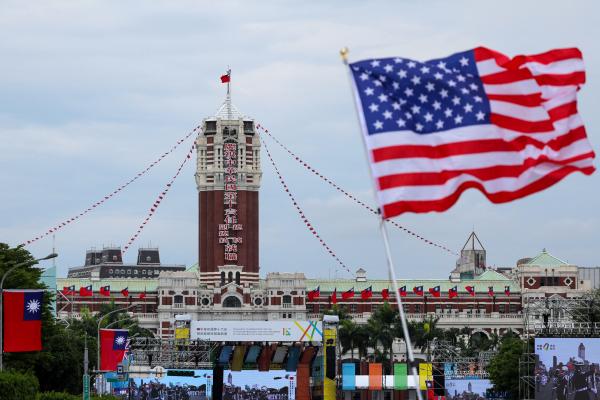
Join Hudson for an expert panel on why these deals are so important for both nations, what they mean for the future of US supply chains, and what potential challenges remain for implementing these deals.

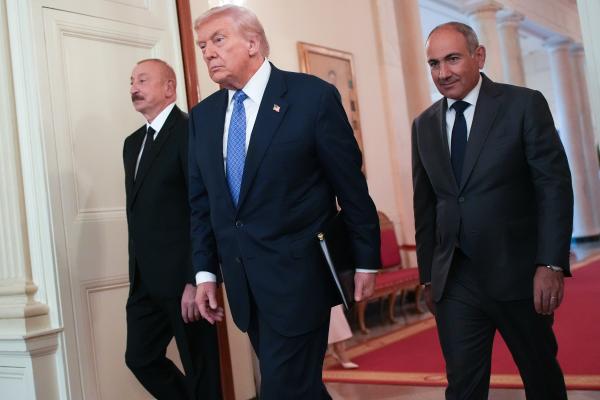
Join Hudson for a conversation with officials who have been at the center of these efforts, expert financiers, and leading regional analysts on what the deal achieved, what comes next, and why sustained US engagement in the South Caucasus matters.
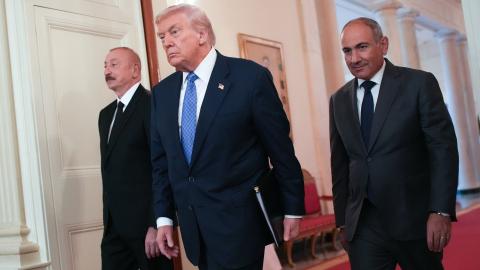
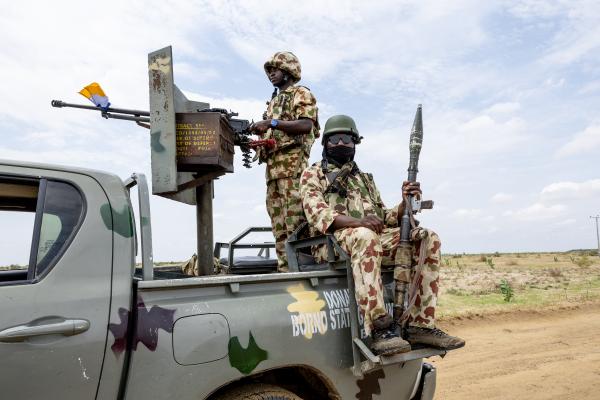
Will this security cooperation be the new normal for US-Nigeria relations, or will Trump escalate his diplomatic and economic pressure?
